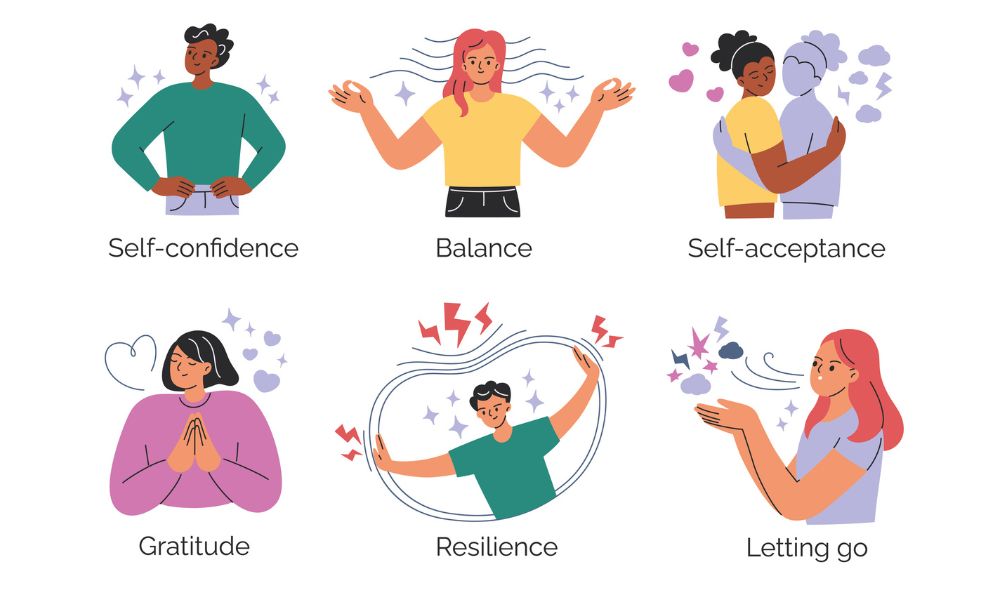Anger can often strike unexpectedly, especially in public or social settings. Learning effective coping strategies allows us to manage our feelings and respond in healthier ways, maintaining our composure and preventing potential conflicts. By understanding our triggers and emotional responses, we can better navigate situations that may cause frustration or irritation.

In moments of rising anger, having techniques at our disposal can make a significant difference. From practicing deep breathing to using assertive communication, we can create a safe space for our emotions without impacting those around us. Connecting with supportive networks and enhancing our resilience can further aid in managing anger effectively.
Key Takeaways
- We can identify our triggers to manage anger better.
- Practising assertive communication helps express our feelings clearly.
- Building a supportive network strengthens our coping mechanisms.
Understanding Anger and Its Impacts

Anger is a complex emotion that influences our mental and physical health. It can affect how we interact with others and how we feel internally. Understanding the psychology behind anger and its potential health consequences is essential for managing this emotion effectively.
The Psychology of Anger
Anger often arises from feelings of frustration, hurt, or perceived threats. It can manifest as both a normal reaction and a tipping point toward aggression. When we experience anger, our body's fight-or-flight response activates. This can lead to heightened anxiety, making us more susceptible to impulsive reactions.
In social settings, uncontrolled anger can escalate tensions and harm relationships. We may react negatively, which can cause conflict and distress. Additionally, unresolved anger can lead to chronic issues like depression or anxiety. Recognising our triggers is vital for managing this emotion. Developing coping strategies will help us express anger constructively instead of destructively.
Anger and Physical Health
Anger isn't just a mental health issue; it significantly impacts our physical health. Chronic anger can lead to serious conditions, including high blood pressure, heart disease, and stroke. Ongoing anger creates stress that strains our cardiovascular system over time.
Furthermore, our behaviours linked to anger, such as aggression, can lead to unhealthy coping mechanisms like substance abuse. These behaviours increase the risk of developing mental health issues, further complicating our wellbeing. Therefore, recognising the connection between anger and physical health is crucial. By managing our anger effectively, we can safeguard not only our mental health but also our physical wellbeing.
Identifying Triggers and Emotional Responses

When we face anger in public or social situations, pinpointing our triggers and understanding our emotional responses is essential. Recognising what sparks our anger can help us manage our feelings better. Developing emotional intelligence can also guide us in handling our reactions more effectively.
Recognising Personal Triggers
Each of us has unique triggers that can provoke anger. These can include specific situations, people, or even particular comments.
Common triggers may involve:
- Frustration due to unmet expectations
- Fear of judgement in social settings
- Sadness when our feelings are disregarded
To identify our triggers, we should reflect on past experiences. Keeping a journal can help track situations where we felt angry. We can write down what happened, how we felt, and our responses. Over time, patterns will emerge.
Recognising these triggers gives us insight, allowing us to prepare for or avoid them when possible. By understanding what leads to our anger, we can better control our reactions in challenging situations.
Emotional Intelligence and Anger
Emotional intelligence is the ability to understand and manage our emotions while also recognising the emotions of others. This skill is crucial when dealing with anger.
When we develop our emotional intelligence, we learn to:
- Sit with our feelings without immediately reacting
- Understand how our anger may connect with other emotions like anxiety or sadness
- Respond assertively instead of aggressively
Practising mindfulness can enhance our emotional intelligence. It helps us stay aware of our feelings in the moment. Techniques like deep breathing or taking a short break can also give us time to process our emotions.
By improving our emotional intelligence, we can reduce the intensity of our anger and respond to social situations with greater calm and clarity.
Anger Management Techniques

Managing anger in public or social settings requires effective techniques to stay calm and composed. By using relaxation methods and cognitive strategies, we can improve our responses to anger and lessen its impact on our daily lives.
Relaxation and Breathing Strategies
Deep breathing exercises are essential tools for handling anger. By taking slow, deep breaths, we can bring more oxygen to our brains, which helps us to think more clearly and calm our emotions. We can try inhaling deeply for a count of four, holding our breath for a count of four, and then exhaling for a count of four.
Another method is to practice progressive muscle relaxation. This involves tensing and then relaxing each muscle group in our body. Starting from our toes and moving up to our head can help reduce physical tension associated with anger.
Additionally, incorporating mindfulness techniques can also help. Focusing on the present moment allows us to acknowledge our feelings without judgement. By recognising and accepting our anger, we can manage it more effectively.
Cognitive and Behavioural Approaches
Cognitive-behavioural therapy (CBT) techniques can assist us in changing how we think about anger. We can identify negative thoughts that lead to anger and replace them with more constructive thoughts.
Keeping an anger journal is a useful practice. Writing down our feelings and the situations that trigger our anger can help us understand our emotional responses better. This self-awareness is crucial for developing healthier coping strategies.
Problem-solving is another effective approach. When we encounter a frustrating situation, we can take a step back to evaluate the problem and brainstorm solutions. This shifts our focus from reacting in anger to taking positive action.
By implementing these techniques, we can improve our anger management skills in various social settings.
Building Assertive Communication Skills

Building assertive communication skills can help us manage anger effectively in public or social settings. By being assertive, we can express our feelings and needs clearly without resorting to aggression. This balance allows us to communicate better with others while minimising conflict.
The Role of Assertiveness in Anger
Assertiveness plays a crucial role in managing anger. When we communicate assertively, we express our thoughts and feelings directly and respectfully. Instead of letting frustration build up or reacting with aggression, we take control of the situation. This approach reduces misunderstandings and promotes healthier relationships.
Being assertive does not mean we are rude or aggressive. Instead, it helps us to set boundaries and express our needs. By doing so, we can decrease our stress levels and manage our anger more effectively. This proactive communication style encourages positive interactions, allowing us to address issues before they escalate.
Techniques for Assertive Speaking
To practise assertive speaking, we can use several techniques that enhance our communication.
-
Use 'I' Statements: Focus on our feelings rather than blaming others. For example, "I feel upset when plans change at the last minute."
-
Maintain Eye Contact: This shows confidence and helps convey our message clearly.
-
Stay Calm and Collected: Take deep breaths to calm ourselves before speaking. This helps prevent a heated reaction.
-
Be Clear and Direct: Use straightforward language to express our thoughts. Avoid vague statements that can lead to confusion.
-
Practice Active Listening: Show that we value others' input. This can help reduce tension and foster mutual respect.
By incorporating these techniques, we can strengthen our assertive communication skills and manage anger more effectively in social situations.
Creating Support Networks
Building a strong support network is crucial for managing anger, especially in public or social situations. Having people around us who understand our feelings can greatly enhance our emotional well-being. Let’s explore why social support matters and how we can find and build our support systems.
The Importance of Social Support
Social support plays a key role in helping us cope with anger. When we have friends, family, or colleagues who listen to us and offer empathy, we feel less isolated. This connection allows us to share our struggles and gain perspective on our feelings.
Supportive relationships also provide a safe space where we can express our emotions without fear of judgement. This fosters a sense of respect and belonging, which is vital for our emotional health. In times of anger, knowing we have someone to turn to can help us manage our reactions more effectively, leading to healthier outcomes.
Finding and Building Support Systems
Finding and building support networks requires intention. We can start by identifying people in our lives who are understanding and approachable. This may include friends, family members, or even support groups focused on anger management.
Engaging in community activities is another way to meet like-minded individuals who can offer support. Whether it’s joining a club or attending workshops, these settings allow us to connect with others who may share similar experiences.
We should also consider being proactive by reaching out to others when we need to talk. Establishing regular check-ins or support sessions can strengthen our networks. Maintaining these relationships relies on openness, empathy, and mutual respect, ensuring that everyone feels valued and understood.
Enhancing Resilience and Coping Mechanisms
Building resilience and effective coping strategies is essential for managing anger, especially in public or social situations. Recognising the tools we have can help us navigate stress and maintain our mental health.
Developing Personal Resilience
Developing personal resilience involves understanding our emotions and how to manage them. We can start by identifying our triggers for anger and finding ways to respond calmly. This might include practising mindfulness, which helps us stay grounded in the moment.
Creating a support system is also crucial. We can share our feelings with trusted friends or family members, allowing us to process emotions together. Engaging in regular physical activity can boost our mood and enhance our resilience by releasing endorphins.
Setting realistic goals and celebrating small achievements can reinforce our confidence. We can evaluate our stress levels by checking in with ourselves regularly, ensuring we are not overwhelmed.
Strategies for Coping with Stress
Effective stress management is vital for reducing chronic anger. One strategy includes deep breathing exercises, which can help calm our nervous system when we feel anger rising. Practising these techniques before attending social events can prepare us for potential stressors.
We might also consider distraction techniques. Engaging in a hobby, reading, or listening to music can take our minds off stress. This can provide a much-needed break from overwhelming emotions.
Maintaining a healthy work-life balance is another essential aspect. Setting boundaries at work and ensuring time for relaxation can significantly reduce stress levels. Regular self-care routines, such as getting enough sleep and eating well, also contribute to our overall resilience.
Lifestyle Modifications to Mitigate Anger
Making changes to our daily routines can significantly help manage anger. By focusing on exercise and diet, we can create a healthier mindset and reduce potential outbursts in social settings.
Exercise as a Tool for Anger Management
Regular physical activity is one of the most effective ways to manage anger. Exercise helps release endorphins, which improve our mood and reduce stress. Activities such as jogging, swimming, or even brisk walking can serve as excellent outlets for pent-up emotions.
We should also take note of our heart health. Engaging in moderate exercise can lower the risk of heart disease, which is important given the stress that anger often creates. Aim for at least 30 minutes of exercise most days of the week to benefit our mental and physical well-being.
Incorporating activities we enjoy can make exercise feel less like a chore. Joining a local sports team or attending group classes can also provide social support, helping us cope better with anger in public.
Diet and Nutrition Considerations
What we eat plays a crucial role in how we feel. A balanced diet can help stabilise our mood and reduce irritability. Foods rich in omega-3 fatty acids, such as salmon and walnuts, can lower feelings of anger and improve heart health.
Maintaining proper hydration is equally important. Dehydration can lead to mood swings and increased frustration. We should ensure we drink adequate water throughout the day.
Additionally, limiting caffeine and sugar intake can help minimise anger triggers. Instead, focusing on whole foods like fruits, vegetables, and whole grains can contribute to a more balanced mood. Adopting these dietary changes can enhance our ability to manage anger effectively.
Handling Conflict in Public Settings
Navigating anger and aggressive behaviour in public interactions can be challenging yet essential for our emotional well-being. We can employ strategies that promote empathy and self-control to turn potentially volatile situations into opportunities for constructive dialogue.
De-Escalating Situations with Empathy
In moments of conflict, we must prioritise empathy. By truly listening to others, we acknowledge their feelings, which can significantly reduce tension. When a person expresses anger, it’s vital to respond with reflective comments that show we understand their concerns.
For example, saying, “I can see why you are upset,” demonstrates we care about their feelings. This simple act can shift the dynamic and open avenues for resolution.
Furthermore, using calm and reassuring body language, such as maintaining an open posture and a soft tone, encourages cooperation. In these tense moments, we should aim to validate their emotions without necessarily agreeing, fostering a safe environment for dialogue.
Maintaining Composure Under Scrutiny
Remaining composed in public settings is paramount. When faced with scrutiny or aggressive behaviour, we can practice deep breathing techniques to maintain our calm. This strategy helps in controlling our reactions and preventing escalation.
By focusing on our breathing for a few moments, we create a mental space. This allows us to respond thoughtfully rather than react impulsively.
It’s also essential to set healthy boundaries. If a situation feels too overwhelming, we can politely excuse ourselves and suggest continuing the conversation later in a more private setting. Our ability to stay calm not only supports our emotional well-being but can also inspire those around us to adopt a similar approach.
Frequently Asked Questions
This section explores practical techniques and strategies for managing anger in various social situations. We will address immediate actions, relationship dynamics, therapeutic approaches, and coping mechanisms for unexpected anger responses.
What techniques can be adopted to manage anger effectively in social situations?
We can implement several techniques to better manage anger in social settings. First, we should practise deep breathing exercises to calm ourselves when tensions rise. This helps reduce the physical symptoms of anger, allowing us to respond more thoughtfully.
Another effective technique is to identify our triggers beforehand. By recognising situations that usually provoke anger, we can prepare strategies to cope, such as stepping away or using positive self-talk.
Which immediate actions can help in controlling anger during public interactions?
In public interactions, immediate actions can be critical. Taking a moment to pause can help us gather our thoughts before responding. We can also try counting to ten or focusing on our surroundings to divert our attention away from the source of anger.
Engaging in physical movement, such as stretching or walking, can also help us release built-up tension quickly and effectively. These small actions can make a significant difference.
What are the key strategies for addressing anger issues within personal relationships?
When addressing anger in personal relationships, clear communication is vital. We need to express our feelings without placing blame, which fosters understanding and reduces escalation. Using "I" statements can help convey our perspective without sounding accusatory.
Setting boundaries is another important strategy. We should discuss what behaviours are unacceptable while ensuring that both parties feel heard and respected.
Can you outline the therapeutic approaches for anger management in adults?
For adults dealing with anger, various therapeutic approaches can be beneficial. Cognitive-behavioural therapy (CBT) is often recommended to help identify and change negative thought patterns that fuel anger.
Group therapy can be another useful option. This setting allows us to share experiences and learn from others facing similar challenges, providing support and practical coping mechanisms.
In what ways can individuals cope with unexpected surges of anger?
When unexpected anger surges occur, immediate self-regulation techniques can help. Engaging in mindful breathing can ground us and prevent impulsive reactions. We should also consider stepping away from the situation, giving ourselves time to cool down.
Writing our feelings down can also provide a constructive outlet. This method allows us to express our emotions without confrontation and to reflect on the causes of our anger.
What steps are involved in the process of managing anger constructively?
Managing anger constructively involves several clear steps. First, we must recognise the feeling of anger as it arises. Acknowledging our emotions is essential in preventing escalation.
Next, we can assess our triggers and consider our typical responses. This self-reflection helps us develop better coping strategies. Finally, practising problem-solving skills can empower us to address the underlying issues that cause our anger.





















